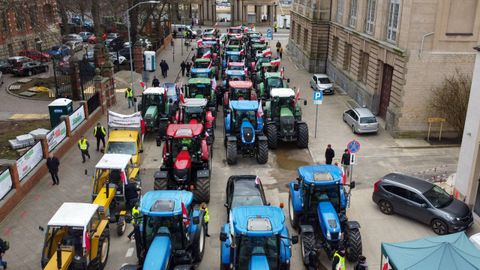
Polish farmers took to the streets of Szczecin this week to protest against the entry of cheap Ukrainian grain, which has devalued the price of Polish grain Marcin Bielecki | EFE
Spain’s grain industry, the eastern European country’s second-largest importer of grain after China, frowns on the proposal
although keep grain flow from Ukraine according to EU it is important to ensure food safety Around the world, farmers from Eastern European countries such as Bulgaria, Poland or Romania raised a cry to heaven when they saw that measures for easier entry were passed last year Ukrainian cereals on the territory of the EU harms their economies. Such is their anger that, in addition to blocking various border crossings, they have forced several governments in the Eastern EU to request European Comission change Ukraine’s grain import policy. After the start of the dispute, the EU agreed suspension of tariffs and maximum import quotas for Ukrainian grain. Corridors of solidarity were even opened to spread the grain.
But just yesterday, according to Efe, the Polish Minister of Agriculture, Henryk Kowalczyk, said in an interview that his government would ask Brussels to re-apply the import quotas from June, duty and quality control on import of grain from Ukraine. And he said that this proposal was supported by states like Slovakia, Czech Republic, Hungary, Romania and Bulgaria.
The main complaint of manufacturers in these countries is entry Ukrainian grain at low prices it brings down the price of the harvest produced in their countries. Some even went so far as to speak of disposalwhile demanding greater control over cereals which comes from Ukrainian fields. Because, as representatives of Polish farmers recently stated, the goods coming from Ukraine “are not of the same density or quality” that is required from domestic producers. Therefore request a 50% tariff. Ukrainian grain, of which about 2.5 million tons are reportedly stored in Poland.
But the re-establishment of import quotas requested by these countries is against the interest of the Spanish primary sector, which is largely dependent on Ukrainian grain exports, primarily in the second half of the grain campaign that begins on July 1. “We are the second country in the volume of grain imports from Ukraine after China,” reminds the general secretary Association for the Trade of Cereals and Oilseeds of Spain (Accoe)Jose Manuel Alvarez.
The data he deals with show that “Spain has the capacity to produce about 20 million tons of grain per year, but between 36 and 38 million tons are needed. Therefore, it is necessary to import about 18 million tons annually corn and from wheat».
The main Spanish dependence is corn, necessary for animal feed. Especially in communities like Galicia, where farms dedicated to milk production, although they also grow milk, require this input to feed their animals.
Question about Ukrainian grain This is of such importance that it was even mentioned last week during a meeting held in Warsaw by Agriculture Minister Luis Planas with his Polish counterpart Henryk Kowalczyk, whom he reminded that there are countries that depend on Ukrainian grain get more than 30% from cereal which consume Therefore, Planas tried to calm Polish spirits by commenting that actions to support Ukraine must be combined with others that minimize the negative impact on countries like Poland. But the Poles want the customs back.
What is also not known for certain is what the consequences of the re-introduction of tariffs could be grain prices. Especially at a time when uncertainty hovers over the sector in Spain due to the low harvest expected due, as José María Álvarez says, to the weather in recent months.
Source: La Vozde Galicia
I am Amelia James, a passionate journalist with a deep-rooted interest in current affairs. I have more than five years of experience in the media industry, working both as an author and editor for 24 Instant News. My main focus lies in international news, particularly regional conflicts and political issues around the world.







